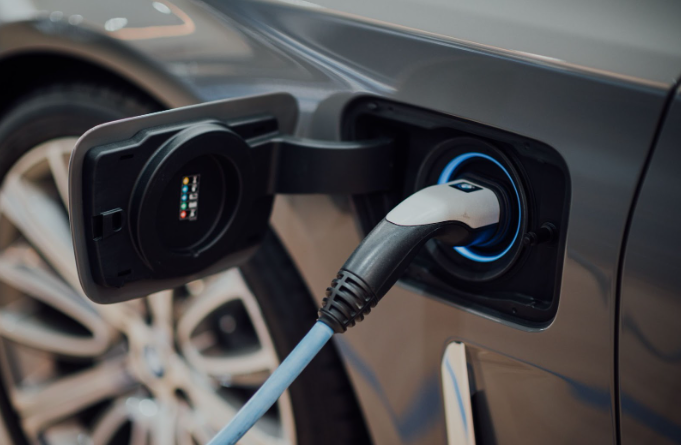ISLAMABAD: After months of stakeholder consultations and inter-agency deliberations, the Government of Pakistan has officially launched the National Electric Vehicle (NEV) Policy 2025–30, calling it a transformational move toward a cleaner, more energy-efficient, and self-reliant future. The new policy is being hailed as a major milestone in the country’s efforts to modernize its transport sector while supporting climate action and local industrial growth.
Special Assistant to the Prime Minister on Industries and Production, Haroon Akhtar Khan, while addressing a press conference in Islamabad, said the NEV Policy is aligned with the Prime Minister’s vision to promote clean, affordable, and sustainable transportation in Pakistan. He highlighted the transport sector as a major source of carbon emissions, adding that a shift to electric mobility is imperative for both environmental sustainability and economic resilience.
According to Mr. Akhtar, one of the key objectives of the policy is to ensure that 30 percent of all new vehicles sold in Pakistan by 2030 are electric. This transition is expected to save around 2.07 billion liters of fuel per year, equating to nearly USD 1 billion in foreign exchange savings. Additionally, the policy aims to reduce carbon emissions by 4.5 million tons annually and cut public health costs by approximately USD 405 million.
The government has allocated Rs. 9 billion in subsidies for the fiscal year 2025–26 to support the deployment of 116,053 electric bikes and 3,171 electric rickshaws. Notably, 25 percent of this subsidy has been earmarked for women, to improve access to affordable and eco-friendly transport. A fully digital platform has been launched to handle applications, verifications, and disbursements transparently.
The policy outlines a roadmap for expanding the electric vehicle ecosystem in the country. Plans are underway to install 40 charging stations on motorways, spaced at an average distance of 105 kilometers. In addition, battery swapping systems, vehicle-to-grid (V2G) programs, and mandatory EV charging points in new building codes will be introduced to promote wider adoption in urban areas.
To support local manufacturing, the government is offering incentives to domestic producers. Already, over 90 percent of parts for two- and three-wheeler EVs are being manufactured locally. Small and medium enterprises (SMEs) will receive targeted support to further deepen localisation. The existing AIDEP preferential tariff regime will continue through 2026 and will be phased out by 2030.
The NEV Policy has been developed through a rigorous consultative process involving more than 60 stakeholders, experts, and institutions since September 2024. A steering committee under the Ministry of Industries and Production will oversee implementation and hold regular monthly and quarterly reviews. Furthermore, the Auditor General of Pakistan will conduct performance audits every six months, and the progress will be shared with the Prime Minister’s Office and made publicly accessible.
Mr. Akhtar emphasised that the NEV Policy 2025–30 is not only an environmental initiative but a key pillar for industrial growth, energy efficiency, and job creation. He said the government has also provided exemptions on customs duties and sales tax on EV components to support the local industry.
He noted that locally produced EVs are 30–40 percent cheaper than imported alternatives, and in the two-wheeler segment alone, more than 90 percent of components are now made in Pakistan. He added that the country’s energy needs for electric vehicles over the next five years, estimated at 126 terawatt-hours, can be met through the existing surplus in the national power grid.
The economic benefits of this transition are expected to be significant. Over the next two and a half decades, the policy could generate savings of nearly Rs. 800 billion through reduced fuel imports, cheaper electricity usage, and the sale of carbon credits. Capacity payments for electricity could drop from Rs. 174 billion to Rs. 105 billion annually, while carbon credit revenues could contribute an additional Rs. 15 billion.
Consumers are also expected to benefit directly. The payback period for an electric rickshaw or bike, despite a higher initial cost, is estimated at just under two years due to fuel cost savings. For example, if an electric bike costs Rs. 150,000 more than its petrol counterpart, the additional investment can be recovered within 22 months through savings on fuel.
To finance the policy, a National EV Adoption Levy will be imposed on the sale of new internal combustion engine (ICE) vehicles. This will help fund subsidies for EVs and create a self-sustaining financial mechanism to support the long-term transition toward electric mobility.
The federal government will also work closely with provincial authorities to streamline EV registration, integrate charging infrastructure into new construction codes, train emergency responders, and implement a model regulatory framework for EV use.
Mr. Akhtar described the policy as a “game-changer” for Pakistan’s economy, environment, and industrial development. He urged citizens, businesses, and provincial governments to embrace the policy and contribute to building a cleaner, smarter, and more sustainable transportation system.




